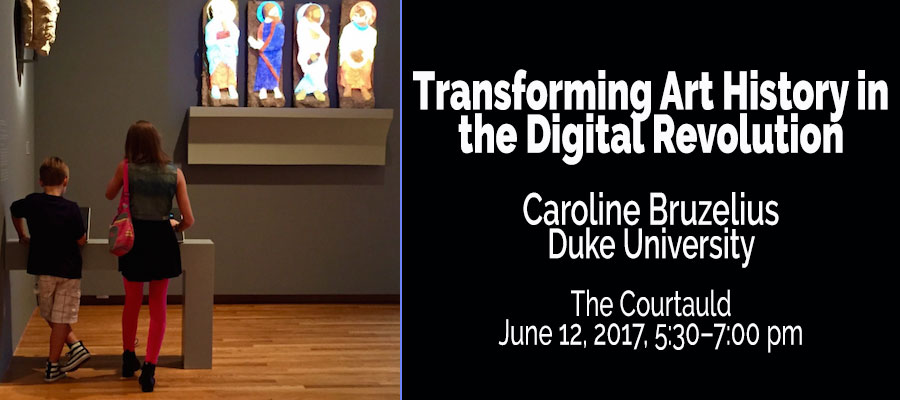Transforming Art History in the Digital Revolution, lecture by Caroline Bruzelius (Duke University), The Courtauld, June 12, 2017, 5:30–7:00 pm
The Courtauld’s new Digital Art History Research Group (#DAHRG) is pleased to welcome Professor Caroline Bruzelius to give the second of the group’s keynote seminar.
The History of Art is a discipline uniquely well-suited to digital technologies. We can now, for example, create provenance databases, map the trajectories of objects, model changes to buildings and cities, recreate lost monuments and reconstruct the setting of an altarpiece. Above all, digital technologies have the capacity to democratize the discipline, engaging the public in narratives about works of art, buildings, and cities in a way that was previously not possible.
This potential offers the potential of new roles for art historians as mediators between the mute object (or building, or city) and the public, expanding our role as teachers and scholars into the community. In this talk, Bruzelius will engage with several public-facing projects that she has been engaged in (Visualizing Venice, The Kingdom of Sicily Image Database; the Sarlat Âpostles Color Project) to reflect upon the ways in which technology can transform experiences of seeing and being in the world.
Caroline Bruzelius is a scholar of medieval architecture in France and Italy, publishing books and articles on French Gothic architecture (the Cistercians; St.-Denis; Notre-Dame in Paris), the medieval churches of Naples, and the architecture of women religious orders and the mendicant orders. Her most recent book, Preaching, Building and Burying. Friars in the Medieval City (Yale University Press, 2014), focuses on how the mendicant practices of outdoor preaching, visiting homes, and burying laymen in convents affected the design, construction, and urban impact of massive convents such as Sta. Croce in Florence, St. Anthony’s in Padua, and the Frari in Venice.
Bruzelius is also a pioneer in exploring how digital technologies can communicate narratives about works of art and the built environment. She is a founding member of the Wired! laboratory at Duke University, a group of faculty and graduate students who integrate visualization technologies with teaching and multi-year research initiatives, such as Visualizing Venice.
From 1994 to 1998 Bruzelius was Director of the American Academy in Rome. She is a Fellow of the American Academy of Arts and Sciences, the Society of Antiquaries, the Medieval Academy of America, and has received numerous research fellowships in the United States and abroad.
This is the second of #DAHRG’s keynote seminars.
